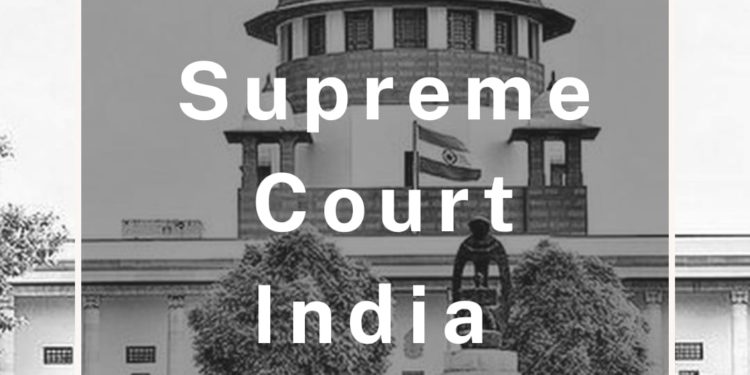The Supreme Court of India has once again exercised their powers under Article 142 of the Constitution while dissolving A Dead Marriage. While observing the matter, the apex court said,
Their marriage is evidently a dead letter.
Case:
The couple got married in 1995 and had a daughter in 1999. They all were residing with husband’s mother in the same home. Due to differences amongst each other, the husband and wife started residing separately from each other on a permanent basis from May 2010 onwards.
In this case, the husband and mother in law had approached the Apex Court challenging the Calcutta High Court order refusing to quash proceedings against them initiated by wife after separation. The court referred the matter to mediation at the Supreme Court Mediation Centre. The parties later settled the issues between them and requested the Court to dissolve their marriage by mutual consent.
Supreme Court
The court noted that, in this case, the parties have been living separately since May 2010 and have been engaged in legal proceedings against each other. The bench of Justices CJI NV Ramana, Surya Kant and Hima Kohli observed,
This Court has, in a catena of previous judgments, invoked its powers under Article 142 of the Constitution to dissolve a marriage, such as in Sneha Parikh v. Manit Kumar. It is unnecessary to belabour the point by reproducing all these rulings.
The court also observed,
In line with these consistent pronouncements, we consider it appropriate to grant the relief sought by the parties for mutual divorce. Husband and Wife have been estranged for over a decade, and the interests of their daughter have already been safeguarded in terms of the Additional Affidavit dated 8th October, 2021 by the husband.
The Mutual Consent Terms dated 5th August, 2021, also make it clear that neither party has any objection if this Court were to dissolve their marriage via exercise of its powers under Article 142.
Quashing all pending criminal and civil cases filed by the wife, after mutual agreement on settlement terms, the Supreme Court said,
For the reasons aforesaid, the marriage between husband and wife is dissolved by way of mutual consent, subject to the condition that husband pays the balance amount of alimony/maintenance to wife within one week from the date of this order.
After the entire amount is paid, the marriage between husband and wife shall stand finally dissolved. Further, the parties shall continue to abide by the terms and conditions of the Mutual Consent Terms dated 5th August, 2021, and the Additional Affidavit dated 8th October, 2021.
As a result thereto, all the pending criminal or civil cases, including the FIR No. 649 of 2012 dated 18th November, 2012, registered at P.S. Jadavpur, are hereby quashed.
Brief Terms of Settlement
Mother-in-Law & Daughter-in-Law have agreed to file the present consent terms as the issues which arose during the course of their marriage are now settled by and between them amicably.
After the mutual settlement discussion by and between the husband and wife, husband has agreed to pay an amount of Rs 90,00,000 (Rupees Ninety Lakhs only)as full and final settlement towards alimony/maintenance/monetary allowance/Settlement amount, which will be remitted to the wife.
Since the dispute has been amicably settled by and between the parties, wife is no longer willing to proceed with the 2012 criminal case, which is still pending before the Court of the Learned 10th Judicial Magistrate at Alipore. Wife shall make every endeavour so that the husband and his mother are discharged/acquitted from the said case before the application of final hearing of the Section 13B Hindu Marriage Act or before the passing of the order of divorce (whichever is earlier).
Husband has further agreed to transfer the property together with the car parking space by executing a Deed of Gift in favour of the wife. The expenses for the stamp duty, registration fees etc. for the transfer of the property will be borne by the husband.
It is agreed by both the husband and the wife that after the present consent terms, the parties shall not claim from each other or their respective families, any kind of compensation or any right in movable or immovable property or inheritance property thereof. That, both the husband and the wife also agree that they or their families shall not file any civil, criminal or any kind of complaints or cases against each other and their respective family members. That, both the husband and wife shall not interfere in each other’s personal or professional life after execution of the present consent terms. That, both husband and wife undertake that they shall not post any defamatory post on social media during pendency of the proceedings and after decree of divorce.
ALSO READ –
SC Dissolves Two-Month Marriage After 16-Yrs | Invokes Irretrievable Breakdown As Ground For Divorce
Supreme Court Grants Divorce To Husband On Grounds Of Irretrievable Breakdown of Marriage After 22-Yrs
United Kingdom | “No Fault” Divorce To Become Law From April 2022; Should India Follow?
Lived Together For 6-Days, Separated Since 26-Years | Supreme Court Requests Wife To Consent For Divorce
READ ORDER | Karnataka High Court Directs Trial Court To First Decide On Perjury Application Filed By Husband Against Wife
Family Court Should Have Litigant Friendly Approach & Help Parties Resolve Matrimonial Disputes | Delhi High Court
ALSO WATCH –
Irretrievable Breakdown in Marriage As Grounds for Divorce | Interview With SC Lawyer Prateek Som
Join our Facebook Group or follow us on social media by clicking on the icons below
Join our Facebook Group or follow us on social media by clicking on the icons below
If you find value in our work, you may choose to donate to Voice For Men Foundation via Milaap OR via UPI: voiceformenindia@hdfcbank (80G tax exemption applicable)































